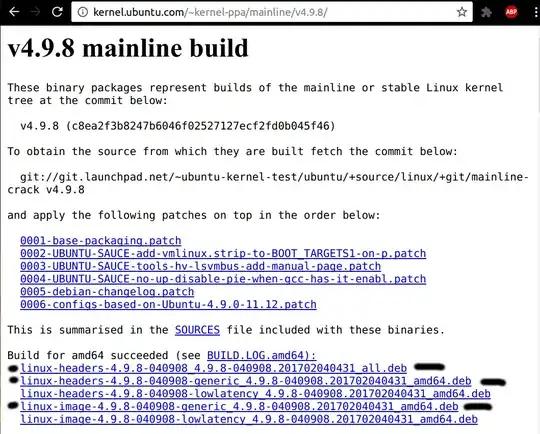I face a problem with installing kernel 4.6 on Ubuntu 16.04 . Someone said because it was unstable. So What is the latest stable version of kernel and how to install it.
2 Answers
In your terminal type
sudo apt-get update
apt-cache search linux-image
Then type sudo apt-get install linux-image-<latest version>
- 399
- 3
- 9
The risk of crashes is highest with release candidate new kernels at this time February 4, 2017 version 4.10 release candidate 4.10-rc6 is the newest. Mainline kernels are considered stable and the latest version here is 4.9.8 which I installed a few hours ago.
Finding the right kernel
Rather than the link you are using, go to (kernel.ubuntu.com - Kernel PPA Mainline) and press the End key:
Now click on the link 4.9.8 and this screen appears:
Note the links with the black airbrush marks. These are the three we will download for Ubuntu 16.04 64-Bit using Intel or AMD processors.
Installing using Terminal
Open a terminal session with ctrl+Alt+T and use:
cd Downloads # Assuming this is your browser download directory
rm *.deb # This erases all *.deb files, ensure only old ones are here
Now toggle back to the download screen above and single-click on all three of the .deb kernel downloads. After downloads complete (you'll see status in your browser) toggle back to terminal session and use:
sudo dpkg -i *.deb
rm *.deb
sudo reboot
Voila! - you are running the latest kernel when first option in grub boot menu is selected. Your older kernel versions are still available under grub's Advanced Options menu.
After installing the newest kernel a dozen times you will ask the question "How do I remove older kernel versions?" and you will find those answers here and here in Ask Ubuntu.
- 102,282
-
If this process is followed does it mean that the kernel would have to be manually upgraded thereafter? How can one switch back to the auto upgraded kernel later on? – Greg Jul 04 '17 at 06:14
-
1Yes manually installed kernels have to be manually upgraded and manually removed (see: https://askubuntu.com/questions/892076/how-to-selectively-purge-old-kernels-all-at-once/892077#892077). Auto-upgraded kernels continue to be installed and are available when rebooting from the *Advanced Options* menu within grub. – WinEunuuchs2Unix Jul 04 '17 at 10:04
-
-
@bicepjai There are hundreds of kernel versions you can download. The one above
4.9.8just happened to be the most current at the time. Since then there have been4.10.xx,4.11.xxand now we are on4.12.xx. Each version could potentially have it's own issues. Generally most sleep/wake (aka suspend/resume) issues are through your system setup inACPIorsystemdorgsettings. There are times when changing a kernel version helps and other times when it doesn't. You can post a question in Ask Ubuntu with your specific problems and mention your current kernel version there. – WinEunuuchs2Unix Jul 27 '17 at 22:37


sudo apt-get distupgradeshould install it. – Severus Tux May 26 '16 at 05:26